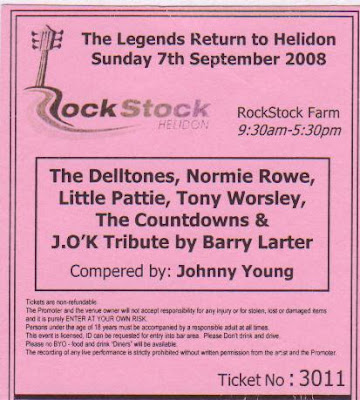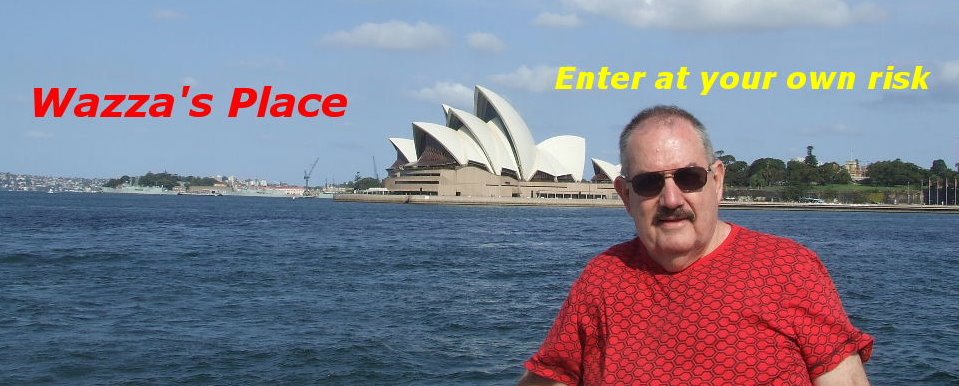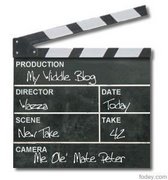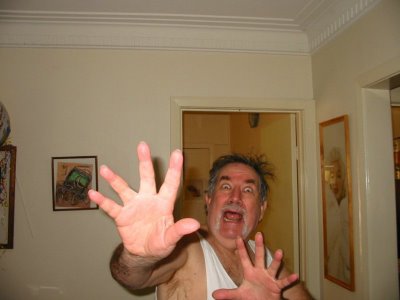The Legends of Rock 'n' Roll Return to Helidon
 Ticket for the "Legends of Rock 'n' Rock Return to Helidon.
Ticket for the "Legends of Rock 'n' Rock Return to Helidon.
In the late 50’s and early 60’s Rock ‘n’ Roll had entered the lives of us teenagers (much to the dislike by our parents)and there was a place outside of Brisbane where country teenagers could go and see their idols. I don’t recall this place as I saw my “pop groups” here in
We decided to attend and what a great day. The show started at
There was a small dance floor near the front of the stage and it was packed with dancers.

This was the first show and it is hoped it will be a yearly event
and judging by the crowd of over 3000 it may well become
the place to be in years to come.

The man on the left in the checkered shirt is Dave, one of my co-workers.
Helidon is a town in the Lockyer Valley region of south east
Queensland, Australia and is located on the Warrego Highway,
106 kms west of the state capital, Brisbane and 21 klms east
of Toowoomba.The town has a population of just over 580.
display their talent and entertain the growing crowds.
As the crowd numbers swelled to hundreds each weekend
due to overwhelming popularity of the local bands, ski events,
fun in the sun and just having a good ole' fashion time so too
did the calibre of the guests who performed at the spa.
Due to popular demand the
Australian music icons and in some cases a stepping stone to
international stardom for the performers.
The big names of the time were
Johnny O'Keefe,and Russel Morris and big name bands like
the Bee Gees (well before they became famous) and the
Delltones would entertain hundreds of screaming fans for hours
on end.
 Johnny Young "working the crowd" while waiting for the next
Johnny Young "working the crowd" while waiting for the next
artist to appear.
The compare of the show was Johnny Young, who was born
John Benjamin de Jong,
singer,composer, producer, disc jockey and television producer
and host. Young was born in Rotterdam, the
He grew up in the Perth Hills suburb of
TVW-7
1965. At the same time, he released two singles, Club 17/Hi Ho
and Go Johnny Go, both on the 7-Teen label.

In 1971 Young developed Young Talent Time, a children's
variety show. The show was a launching pad for several
notable Australian singers including Jamie Redfern, Debra
Byrne, Dannii Minogue (sister of Kylie) and Tina Arena.
It ran 18 years, to 1989. As a songwriter, Young's most
notable work is probably the psychedelicclassic "The Real Thing",
a seminal Australian pop song of the late 1960s recorded by
Russell Morris and produced by another Australian music
industry notable, Ian 'Molly' Meldrum. He also wrote and
produced hits for Ronnie Burns “Smiley”.

Patricia Thelma "Little Pattie" Amphlett was born
in Paddington, Sydney. At the age of 11 she commenced singing
lessons with Gwen Parsons, who also taught Noeleen Batley -
her to audition for TCN 9's TV teen show Saturday Date hosted
by Jimmy Hannan, where she was a hit. She first appeared as
a singer on the television series
of 13. Her first single for the label, was influenced by the surf
music craze. Titled He's "My Blonde Headed, Stompie Wompie,
Real Gone Surfer Boy", and backed with "Stompin' at Maroubra",
the song was released in November 1963 when Pattie was aged 14.

Cover of Little Pattie's CD from my collection.
It reached number two on the Australian music charts (the
number one spot being held by The Beatles "I Want to Hold
Your Hand"). In 1966, at the age of 17 and the height of 4' 10"
she became both the youngest and the shortest person to
entertain troops during the Vietnam War. She subsequently
appeared on several TV shows in
being the Ed Sullivan show.
As Little Pattie entered her twenties, she continued her career
moving into the adult entertainment world. She continues to
perform on television and in clubs.
In 2002 she appeared across
Way To The Top" rock tour. In 2004, General Peter Cosgrove
invited her to be patron of FACE, (Forces Advisory Council on
Entertainment), and she was invited to go to
for Christmas 2005 and New Year 2006.

I’ve always had a “soft spot” for Little Pattie and at a previous
concert I was able to talk to her and I also had her autograph
her current album.This album was a departure to her normal
songs as you will be able to see from the photo below.
Click to enlarge (as you can do with all photos).

Normie Rowe (born Norman John Rowe on
in
Australian pop music in the 1960s.

(My sister was a huge fan of Normie and whenever he toured
in
He was known for his bright edgy tenor voice and dynamic stage
presence. Between 1965 and 1967 Normie was
popular male star but his career was cut short when he was
drafted for compulsory military service in late 1967. Rowe's
subsequent tour of duty in


Working on the
attraction and it wasn't long before he was picked to become
a regular on
"The Go!! Show". Normie's first single, released in April 1965,
was a brooding 'beat' arrangement of Gershwin's "It Ain't
Necessarily So" (from Porgy & Bess). It was a Top Ten hit in
most Capital cities.

The next single became the biggest hit of his career.
The A-side was a cover of "Que Sera Sera" (best known from
the Doris Day original), which was given a 'merseybeat'
treatment (in the manner of The Beatles' "Twist & Shout").
Paired with a powerful version of "Shakin' All Over", the single
became a double-sided #1 hit and it was one of the most
successful Australian singles of the 1960s.
Although his pop career was now effectively over, Normie was
able to fall back on the training from his dance hall days and he
began to concentrate on the club and hotel circuit, and on TV
performances. In 1987 he won great acclaim in his central role
of Jean Valjean in the

In 1958 the Delltones, four young lifesavers, Noel Weiderberg,
Brian Perkins, Warren Lucas and Ian 'Peewee' Wilson,
appeared gawky, gangly and hopeful at the Bronte Surf Club,
then in Australian stadium 'Big Shows' with mentor Johnny
O'Keefe. They appeared on pioneering radio show "Rockville
Junction" and television shows "Six O’clock Rock" and Bandstand.
Young, fresh and enthusiastic, with Bee Gee type harmonies
punctuated by the booming bass tones of Ian 'Peewee'
the Beanpole of Bop, the Delltones were humorous, entertaining
and irrepressible, able to light up a stage or a television screen.


Johnny O'Keefe was instrumental in giving the band the
opportunity to appear in front of large audiences and the
opportunity to observeand learn stagecraft, which just came
naturally to him.

The Delltones with Johnny O'Keefe and Pee Wee, 3rd from the left.
Initially we only had a repertoire of five songs yet we were
playing to up to 15,000 kids at Sydney Stadium as vocal backing
support for U.S. stars like the Everly Brothers, Fabian, Conway
Twitty, Crash Craddock and Jimmy Rodgers.
"The roots of what we were doing was rhythm & blues - I've
always loved black vocal groups," Peewee said recently.
"And it suited me.


Pee Wee Wilson



Five photos of
the Delltones
We were greatly influenced by a vocal group The Diamonds,
who were actually white, but they sounded black."
In 1962 they produced a run of hits that made them a
household name, pumping out songs like “Get a Little Dirt on
Your Hands”.

At the concert there was a tribute to Johnny O’Keefe by
Barry Larter. Now not wanting to take anything away from
his performance I thought it was more fitting that I instead
post about“The Wild One” himself, along with some photos
and a video clip of Johnny.
John Michael O'Keefe (January 19, 1935 – October 6, 1978)
was an Australian rock and roll singer whose career began
in the 1950s and ended with his early death in the late 1970s.
Some of his hits include "Wild One" (1958), "Shout!" and
"She's My Baby". In his twenty-year career, O'Keefe released
over 50 singles, 50 EP's and 100 albums.

 The covers of two Johnny O'Keefe CD's I have.
The covers of two Johnny O'Keefe CD's I have.
His 1959 recording 'Shout' became the Australian Rock 'n' roll'
National Anthem. His biggest hit 'I'm Counting On You' spent a
staggering ten weeks on top of the Sydney Top 40 Charts in
1961. His last hit 'Mockingbird' topped the Australian charts in
1974. Often referred to by his initials, "JOK" or by his nickname,
"The Wild One", O'Keefe was the first and biggest star of the
'classic' rock 'n' roll era in
rock 'n' roll performer to tour the United States, and the first
Australian artist to make the local Top 40 charts, and he remains
Australia's most successful chart performer, with twenty-nine
Top 40 hits to his credit in Australia between 1959 and 1974.
He had already begun performing at dances and 'socials' while
at high school, but his interest in music blossomed after he left
school. A strong early musical influence was the American singer
Johnnie Ray, who toured
and O'Keefe began his singing career as a Ray impersonator.
Johnny O'Keefe's life changed irrevocably after seeing and
hearing Bill Haley singing "Rock Around the Clock" in the film
“Blackboard Jungle” in June 1955. He realised immediately that
this was the style of music he wanted to perform, and from this
point on he dedicated himself single-handedly to becoming a
rock 'n' roll singer and a star.

which included gold lame jackets and brightly coloured suits
trimmed with fake fur. Many of these outfits were made for him
by
red suit trimmed with leopard-print velvet cuffs and lapels
(now in the collection of the
was reputedly made by his mother Thelma
In early 1959 ABC hired Johnny O'Keefe & The Dee Jays as the
resident band for its new one-hour live television show
His contract with
October he moved to ATN-7 as compare of the The Johnny
O'Keefe Show. The show was a major success.

In the early hours of
Greenan and his pregnant wife were driving back to
from the
of Kempsey the driver fell asleep at the wheel of the
and ploughed into a gravel truck.
While the front of the large car bore the brunt of the very
severe impact, all three were seriously injured (O'Keefe being
thrown six metres into a paddock) and Greenan's wife suffered
a miscarriage. O'Keefe suffered multiple lacerations, concussion
and fractures to his head and face; he lost four teeth, and his
hands were also badly lacerated. O'Keefe was air-lifted back to
doctors' orders, he returned to work on
He subsequently had to undergo many gruelling operations
to reconstruct his face, which left his appearance
permanently changed.
Many believe he never fully recovered from the accident and
that it was the catalyst for his subsequent mental health
problems. During the late Sixties and into the Seventies
O'Keefe's personal life became increasingly fraught.
His drug and alcohol use escalated, he suffered a series of
highly-publicised breakdowns, and he was involved in driving
offences and a charge of possession of marijuana.
By the late 1970s O'Keefe had become a heavy consumer of a
wide range of drugs. It was also reported that he was deeply
depressed by the death of his idol Elvis Presley in August 1977.
O'Keefe's last public appearance was on Seven Network's
"Sounds" program, taped on
Johnny O'Keefe died six days later, on 6 October 1978, from
a heart attack induced by an accidental overdose of
prescribed drugs.
This is only a very short version of Johnny O’keefe’s life
story and those who maybe interested can click on the link
below to read a much detailed version of his life.
http://en.wikipedia.org/wiki/Johnny_O%27Keefe
I saw Johnny perform twice at the Lands Office Hotel in
(the only live venue in
He possessed an incredible drive and had a tremendous flair
for showmanship. He was extremely popular with the girls
(dah!) and the boys “wished they were him”. I enjoyed his
performances. He was very loud, loved to sing and his music
was infectious to those around him. He was and still is the
father of rock and roll in




5 comments:
G'Day Warren ~~ Great post about our Aussie singers, I really liked J.O.K. and The Delltones and Normie Rowe. They were all great, and you have put a lot of effort in this post AND nobody had to die. Well done. Take care, my friend,
Love, Merle.
Great obi eeerrr post mate, sorry I missed the show at Helidon, Keith and I met JOK at a Sydney nightclub many years ago, it was after his car accident and his face was pretty scarred still.
I have a photo of my mum holding a photo of JOK ... she was in love. I enjoy listening to his music now, though ... nothing better than a bit of rock and roll
Thanks for this great post Warren.
Have a wonderful weekend.
Take care, Meow
Great post Warren, very educational for me! Thank you.
I'm like you, my celebrities I saw on TV only, but there plenty of local groups playing in the parks and off the loading platforms (RR side of the warehouses) to suit me. When I tired of one, me and my motorcycle would just run over to the next tree or platform.
Mrs. Jim did see Elivis in person at the Louiana Hayride but she would have been trouble young for me. She went with her parents.
I am seeing a lot of gray hair at these recent gigs. WE STILL CARE!
..
BTW Warren, it was nice to read about someone who hasn't died yet here.
Like a lot of other cities, we have a very nice 'classic rock' radio station that is #1 on my pushbuttons.
And I did marry a 'trouble young' thing in the 50's. Had she been Mrs. Jim I would have still been married to her today.
..
Forgot to say, I think the skateboarders and rollerbladers killed our local rock (and hippie) culture. :-)
..
Post a Comment